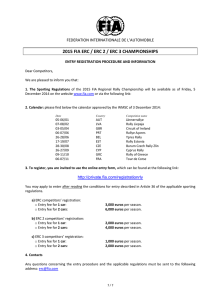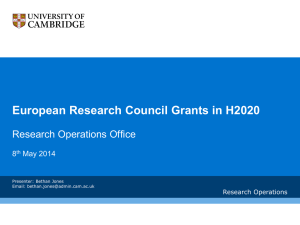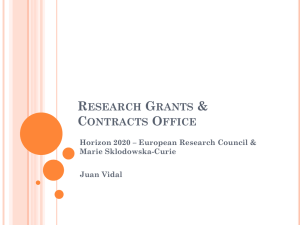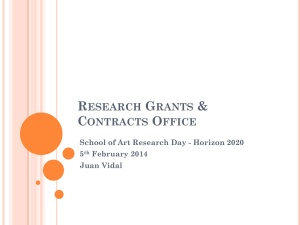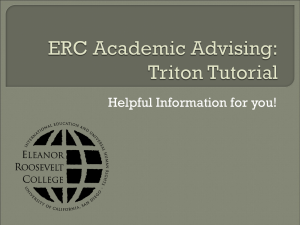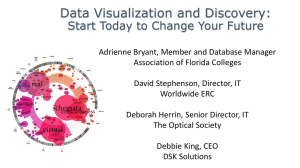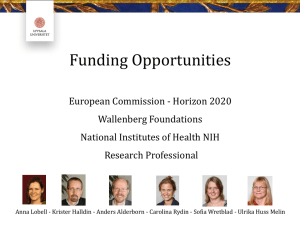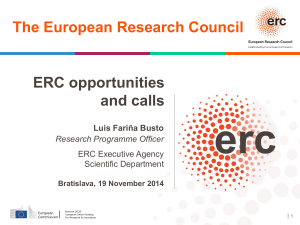downloaded here
advertisement
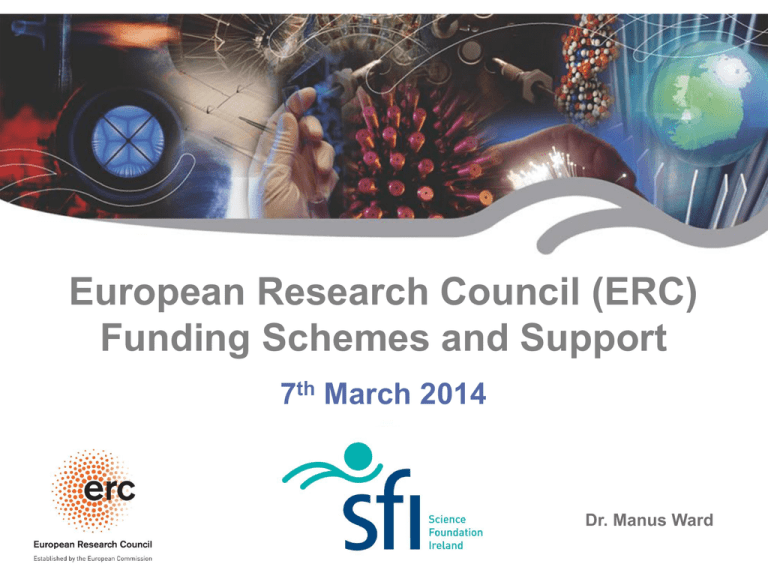
European Research Council (ERC) Funding Schemes and Support 7th March 2014 Dr. Manus Ward SFI - Research for Ireland's Future Introduction: What is the ERC? • The European Research Council (ERC) was officially launched by the European Commission in 2007 as the “flagship component of the 'Ideas Programme' of the European Union's Seventh Research Framework Programme (FP7)”, with a budget of €7.5bn (2007-2013) • Its mission is to encourage the highest-quality research in Europe through competitive funding and to support investigator-initiated research across all fields of research, on the basis of scientific excellence • The emphasis for ERC programmes is on so-called “frontier research”, that is, both basic research in science and technology of critical importance to economic and social welfare, and also research at and beyond the frontiers of understanding, to yield progress in new and exciting research areas that are characterized by an absence of disciplinary boundaries • The ERC is divided into three main research domains: Physical Sciences & Engineering (receiving 44% of the budget) Life Sciences (receiving 39%) Social Sciences & Humanities (receiving 17%) • Scientific excellence is always the sole evaluation criterion. You must have an excellent idea and an excellent track record to have a chance of success ERC under Horizon 2020 • On January 1st 2014, the new Horizon 2020 Research and Innovation Framework officially came into operation • Up to €77bn (£63.2bn) will be budgeted over seven years to support three main pillars: Excellent Science, Competitive Industries and Tackling Societal Challenges. The ERC represents the most prestigious and sizeable part of the Excellent Science pillar, with a budget of ca. €13.1bn (£10.8 bn), which corresponds to ca. 17% of the total Horizon 2020 budget • Greater emphasis on the importance of funding early-career researchers was evident in the 2013 ERC calls, mainly through the separation of the old Starting Grant into two experiencebased funding schemes (Starting Grant and Consolidator Grant). This is being maintained in 2014 under Horizon 2020, exemplified by the fact that the early-career programmes are being launched first, and by the relative budgets for the early-career schemes being enhanced • Very few changes to the ERC under Horizon 2020, but there are two main ones: New 25% flat-rate overhead (forming part of total budget request) Greater restrictions on resubmissions – unsuccessful applicants may be requested to skip two calls if receiving a poor evaluation at Step 1 of the review process ERC Starting Grant (StG) • ERC Starting Grants support up-and-coming research leaders who are about to establish a research team and to start conducting independent research in Europe. The scheme targets promising researchers who have the proven potential of becoming independent research leaders. • Applicants will need to demonstrate the “ground-breaking nature, ambition and feasibility of their scientific proposal”. • Applicants must have already shown the potential for research independence and evidence of scientific maturity. For example, it is expected that applicants will have produced independently at least one important publication without the participation of their PhD supervisor. • In addition, a promising track-record of early achievements appropriate to the applicant’s research field and career stage is expected – this might include high-impact main-author publications, invites to prepare review articles, conference organisation, keynote talks, granted patents, funding success, prizes, awards… • Awards are generally up to €1.5M (ca. £1.23M) over five years for applicants with 2-7 years of experience beyond the PhD (or equivalent) award. This period of eligibility can be increased for fully documented leave, such as maternity leave or long-term illness, up to a maximum of 54 months • The ERC expects a strong commitment to its funded projects – applicants must spend at least 50% of their total working time on their ERC project and a minimum of 50% of their total working time in an EU Member State or Associated Country ERC Consolidator Grant (CoG) • ERC Consolidator Grants were introduced in the 2013 round of funding. They are designed to support researchers at the stage where they are consolidating their own independent research team or programme. The scheme looks to strengthen independent and excellent new individual research teams that have recently been created • Applicants will need to demonstrate the “ground-breaking nature, ambition and feasibility of their scientific proposal”. • Applicants must have already shown the potential for research independence and evidence of scientific maturity. For example, it is normally expected that applicants will have produced independently several important publications without the participation of their PhD supervisor • As for the StG programme, a promising track-record of early achievements appropriate to the applicant’s research field and career stage is expected • Awards are generally up to €2M (£1.65M) over five years for applicants with 7-12 years of experience beyond the PhD (or equivalent) award. The same rules regarding extensions for eligible leave apply, as does the need to show a minimum 50% time commitment to the ERC project • Note: In all ERC grants, indirect (overhead) costs must be included within the requested budget figure, and must be 25% of the total requested grant ERC Advanced Grant (AdG) • ERC Advanced Grants are targeted towards established, exceptional leaders who are recognised internationally within their respective fields, owing to the originality and significance of their research contributions • In most cases, PIs will be expected to demonstrate a record of achievements appropriate to their field and at least matching one or more of the following benchmarks: 10 publications as senior author (or in those fields where alphabetic order of authorship is the norm, joint author) in major international peer-reviewed multidisciplinary scientific journals, and/or in the leading international peer-reviewed journals and peer-reviewed conferences proceedings of their respective field; 3 major research monographs, of which at least one is translated into another language. This benchmark is relevant to research fields where publication of monographs is the norm (e.g., humanities and social sciences). • Examples of other benchmarks: 5 patents granted 10 invited presentations in well-established internationally organised conferences organisation as a member of the steering and/or organising committee of 3 well-established international conferences or congresses Major contributions to launching the careers of outstanding researchers; Recognised leadership in industrial innovation. • ERC Advanced Grants are generally up to €2.5M (£2.05M) over five years. A minimum time commitment of 30% is expected for AdG projects. Ireland’s ERC Award Holders: StG 2013 Starting Grant Winners Dr David Hoey (University of Limerick) Dr Aoife Gowen (Dublin Inst. of Technology) http://www.sfi.ie/international/the-european-research-councilintroduction/erc-awards-programme-awardees-in-ireland.html Ireland’s ERC Award Holders: CoG Dr Marie-Louise Coolahan (NUI Galway) “The Reception and Circulation of Early Modern’s Women’s Writing, 1550-1700” Prof Martin Albrecht (UCD) “Exploiting Synergistic Properties of Mesoionic Carbene Complexes: Teaching Rusty Metals Challenging Catalysis” Ireland’s ERC Award Holders: AdG • Top row, from left to right: • Bottom row, from left to right: • Prof Kevin O’Rourke, TCD (2009) • Prof James Heckman, UCD (2010) • Prof Rob Kitchin, NUIM (2012) • Prof Luke O’Neill, TCD (2010) • Prof Peter Humphries, TCD (2012) • Prof Kenneth Wolfe, TCD (2010) • Prof John Boland, TCD (2012) • Prof Frédéric Dias, UCD (2011) • Prof Bashar Nuseibeh, OU/UL (2012) • Prof Dan Bradley, TCD (2011) Proposal Structure The “Information for Applicants” document for the 2014 StG and CoG calls was published on the 30th January. The following information summarises what can be found in detail in this document, which is the essential guide for preparing an application to these calls: http://erc.europa.eu/sites/default/files/document/file/info_for_applicants_stg_cog_2014.pdf • Three separate components to the application, prepared on the EC Participant Portal Submission System (PPSS) – familiarise yourself with this early! • Administrative Proposal Submission Forms (not actually now termed “Part A”) Research Proposal (still confusingly called “Part B”!) Supporting Documentation Five sections to the Administrative Proposal Submission Forms: 1. General information 2. Administrative data of participating organisations 3. Budget 4. Ethics 5. Call-specific questions Proposal Structure • Part B – Research Proposal: Separated into two parts (Parts B1 and B2) • Part B1 – divided into four sections: Cover page (template provided) a) Extended synopsis of the scientific proposal (max. 5 pages) b) Curriculum vitae (max. 2 pages – suggested format given but can be modified) c) Early achievements or 10-year track record (max. 2 pages) • Part B2 – the Scientific proposal (max. 15 pages, divided into three sections): a) State of the art and objectives b) Methodology c) Resources (including project costs) • Supporting Documentation (PDF format) • Host institution letter of support (template provided) Scanned copy of PhD certificate or other documents confirming eligibility Any other supporting documents (e.g., ethical self-assessments) A useful checklist is provided on Page 31 of the StG/CoG “Info for Applicants” document ERC Peer Review Evaluation Not AdG 20-25% go through Between 30 and 40% are funded depending on the panel. ERC Panel Structure Life Sciences Social Sciences and Humanities LS1 Molecular and Structural Biology and Biochemistry SH1 Individuals, institutions and markets LS2 Genetics, Genomics, Bioinformatics and Systems Biology SH2 Institutions, values, beliefs and behaviour SH3 Environment, space and population LS3 Cellular and Developmental Biology SH4 The Human Mind and its complexity LS4 Physiology, Pathophysiology and Endocrinology SH5 Cultures and cultural production LS5 Neurosciences and neural disorders SH6 The study of the human past LS6 Immunity and infection LS7 Diagnostic tools, therapies and public health Physical Sciences & Engineering LS8 Evolutionary, population and environmental biology PE1 Mathematics LS9 Applied life sciences and biotechnology PE2 Fundamental constituents of matter PE3 Condensed matter physics PE4 Physical and analytical chemical sciences PE5 Materials and synthesis PE6 Computer science and informatics PE7 Systems and communication engineering PE8 Products and processes engineering PE9 Universe sciences PE10 Earth system science • • Annex 1 in the StG/CoG “Information for Applicants” (pp. 46-55) divides each Panel into several sub-headings to give greater depth. It is of crucial importance to carefully study the panel structures to find the very best panel to submit your application to. Tips for ERC Proposal Writing • One of the most important considerations: When are you are going to apply? An ERC application is not something that should be rushed, and you should allow a significant amount of time to allow ideas to develop, for the necessary preliminary work and data to be obtained, and for the proposal to be carefully written, checked, and revised in order to be in the very best shape for submission. • Be aware of the ERC’s plans for the various schemes in any given year—in 2013, significantly more funding was assigned to the early-career programmes, and a similar scenario is anticipated for 2014. However, 2015 may possibly see the balance shift back towards the Advanced Grant scheme for more established researchers. Think strategically!! • Since the ERC’s panel structure essentially remains the same, covering all research topics, and the application format is modified only slightly from year to year, you can start preparing your application at any time. You will need plenty of time and the deadline is strict, so it is best to start early. Tips for ERC Proposal Writing • Register as an expert for the European Commission. You will gain invaluable insight into the application process and forge vital relationships within your field. • Prepare the supporting documents early, in particular any concerning eligibility for time extension, or the commitment of the Host Institution. • Reserve several weeks for writing at the absolute minimum. Assembling your preliminary data, shaping the story, and checking the references is time consuming. Consider a 2–3 week retreat for the writing alone, plus appropriate time for editing and polishing. • Remember that the applicants you are competing with and the peer reviewers could be from anywhere in Europe or, indeed, the rest of the world. It is thus important to bear in mind the current status of research internationally, and to write your proposal in a clear and unambiguous manner. • Get advice! Consult with your host institution well in advance and discuss your budget plan with the relevant person. If your university has support for EU and/or ERC proposals, consult their expertise. If you have a colleague who is already funded by the ERC, discuss your application with them. Contact the ERC National Contact Point for assistance. Tips for ERC Proposal Writing • Clearly and confidently answer the following: What is the problem? Why is it significant? What makes your solution/approach to the problem ground breaking? • Demonstrate leadership: Make the ERC reviewers want to fund you. Give examples… Student supervision history – where they are now, their funding successes, etc. Experience in leading research collaborations (national and international) • If interdisciplinary elements are in the proposal, illustrate how you are the senior partner • Clearly describe your ground-breaking idea – explain why it has not been done before. Put the ideas front and centre – don’t leave key messages to the end. • Show how the research will provide impact if/when successful. What kind of impact(s)? • Is your proposal risky? If it is, that’s good, but where appropriate to do so include a brief discussion of a Plan B in order to mitigate some of the risk Tips for ERC Proposal Writing • Ensure that Part B1 of your proposal is equally approachable and convincing to specialists and non-specialists alike (REMEMBER: Only Part B1 of your proposal is assessed at Step 1, which is a panel-review process only) • In preparing Parts B1 and B2, ensure that they are written such that a reviewer need not refer to one part in order for the other part of the proposal to make sense • StG/CoG specific suggestions: Demonstrate independence (good responses to questions at the interview stage) Describe your international experience and how it has benefitted your career Explain how the award will enhance your independent career and how your plans align to the aims and goals of the ERC programme Be aware of a potential Irish independence advantage – many Irish-based earlycareer researchers may have more experience of supervision and reviewing than other European counterparts Endeavour to reduce any references to former mentors/supervisors to a minimum • Consult the SFI Website!! There is a new resource providing important and valuable information about the ERC. Visit the International Section at: • http://www.sfi.ie/international/the-european-research-council-introduction/ Interview Tips (General) • Report any potential conflicts to ERCEA staff • Avoid pressurised waiting rooms if possible • Getting to this stage => fundable applicant. Focus the presentation on the project (consider what was in the short application) • ERC grants are portable – be aware of this and plan to negotiate with your Host Institution • Know your budget!!! There is no time to look in the proposal, etc. Know the justification for each cost • Memorise plans for dissemination/making impact/innovation Interview Tips (Panel) • Panel considerations • Did the applicant write the proposal? • Can the applicant lead a group? • Is the idea groundbreaking? • Is the applicant already independent or in transition? • Panel questions • It may be intense – be prepared! • Panel members may relay postal reviewers’ queries/issues • They will challenge the applicant’s understanding • memorise state-of-the-art references • possible backup slide with references (only if prompted to present) • Be aware! • No more than one or two in the panel are likely to be specialists in your field • In the presentation, you should explain how the project will contribute to universal knowledge as well as how it extends knowledge in your particular discipline Interview Tips (Presentation) • Timing is crucial! Don’t go over the time!! • Possible use of buzzers/bells • Hard shutoff is quite likely • Don’t leave the key message(s) until the end of presentation • Do not cram too much in – use slides only to hammer home important points • Good preparation will be appreciated by the Panel (working for 2 days!) • Inject energy and passion, maybe lighten the mood (but don’t force jokes!) • Do everything to appear relaxed and on top of your subject • Presentation structure/time allowed • Varies from panel to panel • Read the instructions • Slides possibly diagram/image heavy – no need to repeat text you plan to say. Interview Tips (Content) • What is the problem, why is it significant, why is your solution approach ground breaking? • Demonstrate independence (good responses to questions) • Describe international experience obtained and any special skills and competences • Be aware of the potential Irish independence advantage (compared with what is often available to applicants from other EU countries) • Details will be in your proposal – no need to repeat • Have backup slides prepared with responses to likely questions (but only present them on request) • Demonstrate leadership – why you? • Student supervision, where they are now, won first grant when, etc. • Prepare material on host institution/facilities, but present only on request • Only refer to previous work in order to relate your proposed work to it Interview Tips (Content) • Focus on Leadership • Reduce references to former mentors/supervisors • If interdisciplinary elements are in the proposal, be sure to illustrate that you are the senior partner • Focus on the Idea • Groundbreaking? • State-of-the-art references again / backup slide • Why has it not been done before? • What impact(s) will be made if/when successful? • Is it risky? • Brief discussion of Plan B Support Available for ERC Activities • Two ERC National Contact Points (NCPs) in Ireland: SFI is responsible for the Life Sciences and Physical Sciences & Engineering research domains. Current NCP: Graeme Horley The Irish Research Council (IRC) is responsible for the Social Sciences & Humanities domain. Current NCP: Paul Kilkenny • The NCPs provide information events, hold mock interviews, and provide feedback (where possible) on draft proposals. NCPs in Ireland are not associated with the ERC on a fulltime basis, which is often not the case in other (larger) European countries. • Enterprise Ireland are responsible for managing Ireland’s coordination with the Horizon 2020 framework. A new Irish Horizon 2020 website (http://www.horizon2020.ie/) is an additional useful resource. Changes to ERC in H2020 • Restrictions on applications to future calls for those failing to get through Step 1 of the evaluation process have been made tougher: “C” grade – may not apply for the following two years (regardless of scheme) “B” grade – nay not apply in the following year (regardless of scheme) • Changes to eligibility rules for Medical Doctor (MD) applicants: MDs are not accepted on their own as equivalent to PhDs Must provide info on the MD and a PhD or other proof of an appointment that requires doctoral equivalency (e.g., a post-doc or professorial appointment) Must provide info on research experience to substantiate equivalence Two extra years allowed (StG: 4-9 years post-MD; CoG: 9-14 years post-MD) If holding MD and PhD degrees, the earlier degree that renders an applicant eligible takes priority • New online administrative submission forms (accessible through the PPSS) • New templates for Parts B1 and B2, with the following changes: Introduction of a model CV (in Part B1 – can be modified) Compulsory table format of the applicant’s funding ID (Part B1) New budget table in Part B2, Section c) • New 25% flat-rate overhead as component of requested budget Key Dates Useful Links • ERC Homepage: http://erc.europa.eu/ • 2014 ERC Work Programme: http://erc.europa.eu/sites/default/files/document/file/ERC_Work_Programme_2014.pdf • 2014 StG/CoG Information for Applicants: http://erc.europa.eu/sites/default/files/document/file/info_for_applicants_stg_cog_2014.pdf • EC Participant Portal: http://ec.europa.eu/research/participants/portal/desktop/en/home.html • SFI’s ERC Information Resource: http://www.sfi.ie/international/the-european-research-council-introduction/ • Ireland’s Horizon 2020 Website: http://www.horizon2020.ie/

